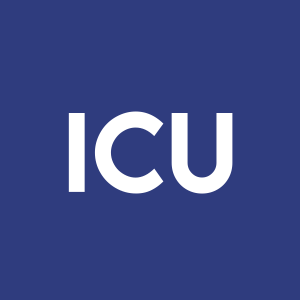FDA Approves Feasibility Study with SeaStar Medical’s Selective Cytopheretic Device in Adults with Cardiorenal Syndrome
Rhea-AI Summary
SeaStar Medical (Nasdaq: ICU) received FDA approval for an investigational device exemption (IDE) to study their Selective Cytopheretic Device (SCD-ADULT) in reducing inflammation in adult patients with acute heart failure and worsening renal function. The feasibility study will enroll 20 patients across up to five clinical sites, funded by a $3.6 million NIH grant awarded to Innovative BioTherapies.
The study will be led by SCD inventor Dr. H. David Humes, with SeaStar Medical acting as clinical research organization. The device received Breakthrough Device Designation from FDA's CBER in September 2023 for cardiorenal syndrome with LVAD. The company estimates the total addressable U.S. market for SCD-ADULT in cardiorenal syndrome at over $1 billion annually.
Positive
- FDA approval of IDE application for SCD-ADULT study
- Full funding secured through $3.6 million NIH grant
- FDA Breakthrough Device Designation obtained in September 2023
- Estimated $1 billion annual U.S. market opportunity
- Company will receive portion of NIH grant as acting CRO
Negative
- Early-stage feasibility study with patient enrollment (20)
- Additional pivotal study will be required for full approval
News Market Reaction – ICU
On the day this news was published, ICU declined 2.01%, reflecting a moderate negative market reaction.
Data tracked by StockTitan Argus on the day of publication.
Study to be conducted under
DENVER, Jan. 13, 2025 (GLOBE NEWSWIRE) -- SeaStar Medical Holding Corporation (Nasdaq: ICU), a commercial-stage medical device company developing proprietary solutions to reduce the consequences of hyperinflammation on vital organs, announces that the U.S. Food and Drug Administration (FDA) has approved an investigational device exemption (IDE) application to evaluate the safety and initial efficacy of SeaStar Medical’s Selective Cytopheretic Device (SCD-ADULT) in reducing inflammation in adult patients with acute heart failure with worsening renal function due to cardiorenal syndrome or severe right ventricular failure awaiting a left ventricular assist device (LVAD) implantation.
This feasibility study is expected to enroll 20 patients at up to five clinical sites and will be funded by a previously announced $3.6 million National Institutes of Health (NIH) grant awarded to Innovative BioTherapies (IBT), which is led by SCD inventor H. David Humes, MD, Professor, Division of Nephrology, Internal Medicine, University of Michigan and SeaStar Medical Scientific Advisor. Dr. Humes will serve as lead investigator for the study and SeaStar Medical will act as clinical research organization (CRO). The FDA’s Center for Biologics Evaluation and Research (CBER) granted Breakthrough Device Designation for the SCD in cardiorenal syndrome with LVAD in September 2023.
“Oftentimes patients with cardiorenal syndrome and worsening renal or cardiac function are ineligible for lifesaving LVAD implantation due to the severity of their condition,” said Kevin Chung, MD, Chief Medical Officer of SeaStar Medical. “This study is designed to determine whether employing the SCD-ADULT to reduce hyperinflammation in these extremely ill patients can sufficiently improve their condition to bridge to LVAD implantation. Findings from this study could inform a future pivotal study in this population.”
“We estimate the total addressable U.S. market for the SCD-ADULT in cardiorenal syndrome at more than
About Hyperinflammation
Hyperinflammation is the overproduction or overactivity of inflammatory cells that can lead to damage of vital organs. It occurs when the body overproduces inflammatory effector cells and other molecules that can be toxic or damaging to vital organs, and result in multi-organ failure and even death. This is known as the cytokine storm.
Selective Cytopheretic Device
The Selective Cytopheretic Device (SCD) is a patented cell-directed extracorporeal device that employs immunomodulating technology to selectively target proinflammatory neutrophils and monocytes during continuous renal replacement therapy (CRRT) and reduces the hyperinflammatory milieu including the cytokine storm. Unlike pathogen removal and other blood-purification tools, the SCD is integrated with CRRT hemofiltration systems to selectively target and transition proinflammatory monocytes to a reparative state and promote activated neutrophils to be less inflammatory. This unique immunomodulation approach may promote long-term organ recovery and eliminate the need for future renal replacement therapy (RRT), including dialysis.
In addition to cardiorenal syndrome with LVAD, the SCD has been awarded FDA Breakthrough Device Designation in the following indications:
- Adult Acute Kidney Injury
- Hepatorenal Syndrome
- Chronic Dialysis
About Innovative BioTherapies (IBT)
IBT is a privately held biotechnology company founded to facilitate the commercialization of technology developed in Dr. H. David Humes’ academic laboratory. IBT’s research and development program is primarily supported by federal grants and contracts that focus on developing cell therapy devices utilizing human progenitor cells, biomimetic materials and micro-electromechanical systems (MEMs) technology. More information is available at http://www.innbio.com/.
About SeaStar Medical
SeaStar Medical is a commercial-stage medical technology company that is redefining how extracorporeal therapies may reduce the consequences of excessive inflammation on vital organs. SeaStar Medical’s novel technologies rely on science and innovation to provide life-saving solutions to critically ill patients. The Company is developing and commercializing cell-directed extracorporeal therapies that target the effector cells that drive systemic inflammation, causing direct tissue damage and secreting a range of pro-inflammatory cytokines that initiate and propagate imbalanced immune responses. For more information visit www.seastarmedical.com or visit us on LinkedIn or X.
Forward-Looking Statements
This press release contains certain forward-looking statements within the meaning of the “safe harbor” provisions of the Private Securities Litigation Reform Act of 1995. These forward-looking statements include, without limitation, the ability of the SCD-ADULT to treat patients with cardiorenal syndrome or severe right ventricular failure awaiting a LVAD implantation; the expected patient enrollments and clinical sites for the feasibility study and other diseases; the expected benefits of the feasibility study and the total addressable market for the SCD-ADULT in cardiorenal syndrome. Words such as “believe,” “project,” “expect,” “anticipate,” “estimate,” “intend,” “strategy,” “future,” “opportunity,” “plan,” “may,” “should,” “will,” “would,” “will be,” “will continue,” “will likely result,” and similar expressions are intended to identify such forward-looking statements. Forward-looking statements are predictions, projections and other statements about future events that are based on current expectations and assumptions and, as a result, are subject to significant risks and uncertainties that could cause the actual results to differ materially from the expected results. Most of these factors are outside SeaStar Medical’s control and are difficult to predict. Factors that may cause actual future events to differ materially from the expected results include, but are not limited to: (i) the risk that SeaStar Medical may not be able to obtain regulatory approval of its SCD product candidates; (ii) the risk that SeaStar Medical may not be able to raise sufficient capital to fund its operations, including current or future clinical trials; (iii) the risk that SeaStar Medical and its current and future collaborators are unable to successfully develop and commercialize its products or services, or experience significant delays in doing so, including failure to achieve approval of its products by applicable federal and state regulators, (iv) the risk that SeaStar Medical may never achieve or sustain profitability; (v) the risk that SeaStar Medical may not be able to access funding under existing agreements; (vi) the risk that third-parties suppliers and manufacturers are not able to fully and timely meet their obligations, (vii) the risk of product liability or regulatory lawsuits or proceedings relating to SeaStar Medical’s products and services, (viii) the risk that SeaStar Medical is unable to secure or protect its intellectual property, and (ix) other risks and uncertainties indicated from time to time in SeaStar Medical’s Annual Report on Form 10-K, including those under the “Risk Factors” section therein and in SeaStar Medical’s other filings with the SEC. The foregoing list of factors is not exhaustive. Forward-looking statements speak only as of the date they are made. Readers are cautioned not to put undue reliance on forward-looking statements, and SeaStar Medical assumes no obligation and does not intend to update or revise these forward-looking statements, whether as a result of new information, future events, or otherwise.
Contact:
Alliance Advisors IR
Jody Cain
(310) 691-7100
Jcain@allianceadvisors.com
# # #








